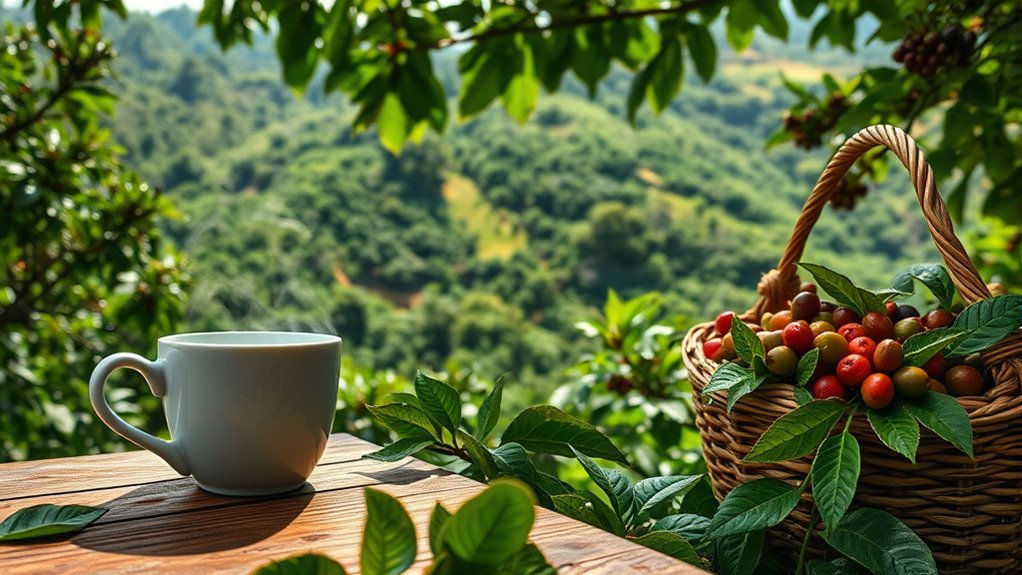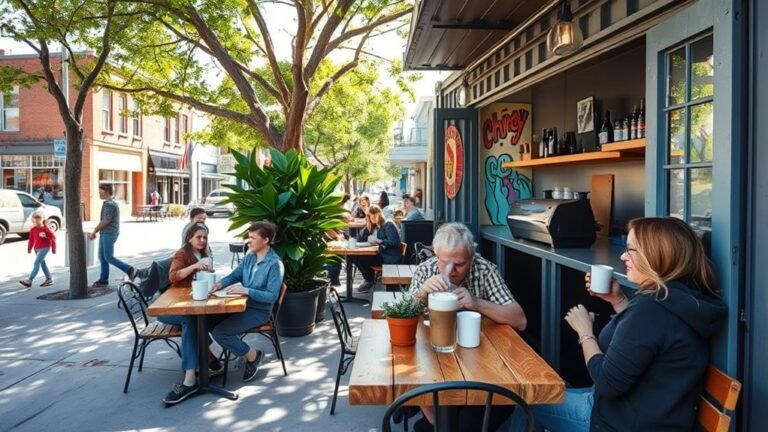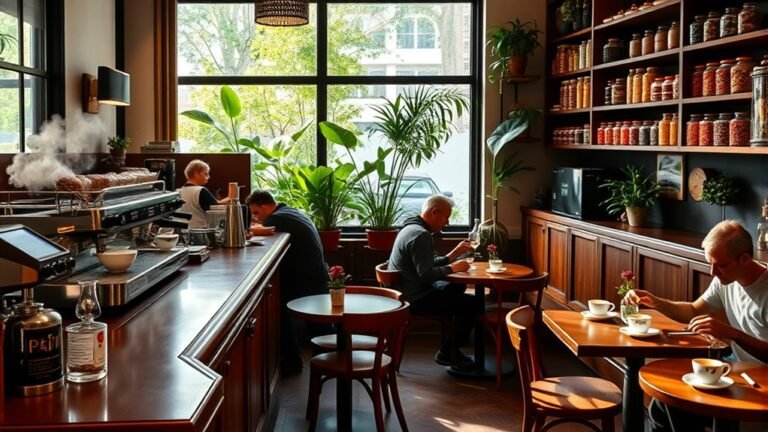The Impact of Coffee on the Environment: Sustainable Practices
You might not realize how much coffee farming affects the environment—deforestation, water overuse, and chemical pollution all play a role. But sustainable practices, like shade-grown coffee, organic farming, and efficient irrigation, help protect ecosystems and local communities. Choosing fair trade options supports farmers and pushes the industry toward eco-friendly methods. By understanding these impacts and solutions, you can help drive positive change in how coffee is grown and enjoyed worldwide.
Environmental Challenges in Coffee Cultivation
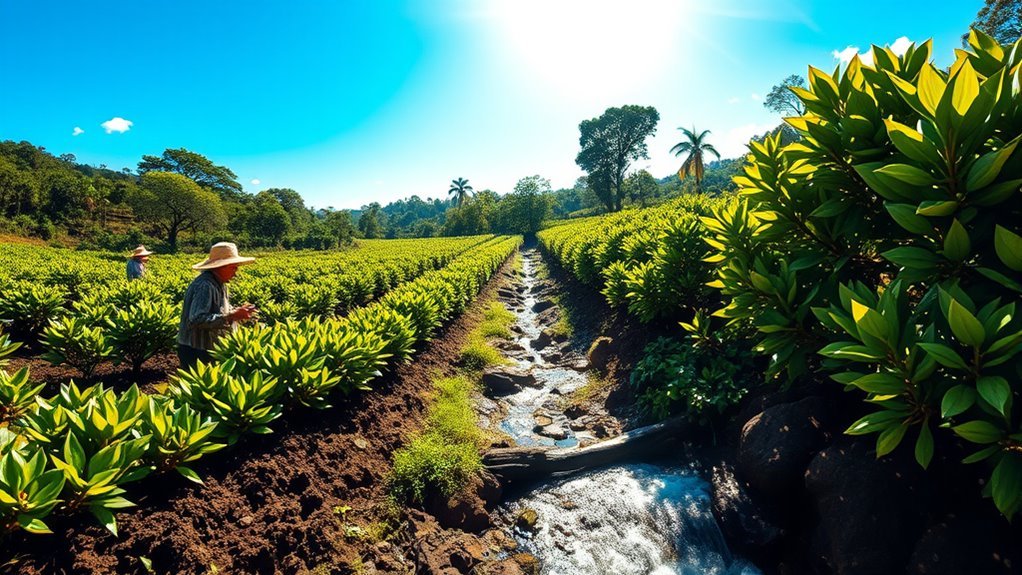
Although coffee is one of the most popular beverages worldwide, its cultivation poses significant environmental challenges you might not be aware of. Climate change is shifting coffee-growing regions, forcing farmers to adapt or lose their livelihoods. Rising temperatures and unpredictable weather patterns increase vulnerability, making pest management more complex and costly. You should know that many coffee farmers rely heavily on chemical pesticides, which can harm ecosystems and reduce biodiversity. This dependency threatens not only the environment but also the freedom of farmers to cultivate sustainably. To protect your cup of coffee and support ecological balance, advocating for integrated pest management and climate-resilient practices is essential. By understanding these challenges, you empower yourself to demand more sustainable coffee production that respects both the planet and human freedom.
Effects of Deforestation and Habitat Loss
When coffee plantations expand into forests, they often cause deforestation and habitat loss that threaten countless species. You need to understand that deforestation impacts go beyond just cutting down trees—it disrupts entire ecosystems, leading to habitat destruction for wildlife dependent on those forests. This loss reduces biodiversity and weakens natural resilience, making ecosystems more vulnerable to climate change. If you care about freedom—not just for humans but for nature itself—you’ll see how unchecked coffee farming can restrict the freedom of countless creatures by erasing their homes. Advocating for sustainable coffee practices means pushing back against these harmful deforestation impacts. By demanding shade-grown or agroforestry coffee, you support methods that preserve habitats, allowing both wildlife and coffee farmers to thrive without sacrificing the wild spaces we all depend on.
Water Usage and Pollution Concerns
You might not realize how much water goes into growing your daily cup of coffee, with cultivation demanding thousands of liters per kilogram of beans. Beyond usage, wastewater and chemical runoff from farms can contaminate local waterways, threatening ecosystems and communities. It’s essential to explore and support strategies that reduce water consumption and prevent pollution in coffee production.
Coffee Cultivation Water Demand
Because coffee plants require substantial amounts of water throughout their growth cycle, understanding their water demand is essential for evaluating environmental impacts. You should know that coffee irrigation practices vary widely, with some farms relying heavily on supplemental watering, especially in regions facing irregular rainfall due to climate impact. This increased water use can strain local water resources, threatening both ecosystems and communities. If you want to support sustainable coffee, it’s vital to advocate for efficient irrigation techniques like drip systems that minimize waste. By choosing coffee produced with responsible water management, you help reduce the environmental footprint and preserve water availability. Recognizing the direct link between coffee cultivation water demand and climate challenges empowers you to push for farming methods that respect natural limits while maintaining your freedom to enjoy coffee consciously.
Wastewater and Chemical Runoff
Beyond the water used for irrigation, coffee farming generates significant wastewater and chemical runoff that can harm local waterways. When coffee cherries are processed, large volumes of wastewater containing organic matter and chemicals enter nearby streams, threatening aquatic ecosystems. Without proper wastewater treatment, these pollutants degrade water quality and disrupt communities relying on clean water. You need to understand that chemical management is essential to prevent harmful pesticides and fertilizers from leaching into soil and water. Unfortunately, many coffee farms lack effective systems to contain these substances, leading to persistent contamination. Advocating for improved wastewater treatment infrastructure and responsible chemical management empowers farmers to protect the environment while maintaining productivity. Your support can help push for sustainable practices that preserve water freedom for both nature and people downstream.
Strategies for Water Conservation
Although coffee cultivation demands substantial water resources and often contributes to pollution, there are effective strategies you can advocate for to reduce its environmental impact. By adopting innovative water conservation methods, coffee producers can minimize waste and protect local ecosystems. You should encourage:
- Implementing drip irrigation to deliver water directly to roots, cutting water use by up to 50%
- Utilizing rainwater harvesting systems to capture and store natural rainfall for irrigation needs
- Treating and recycling wastewater to prevent chemical runoff into waterways
- Promoting shade-grown coffee practices that reduce evaporation and maintain soil moisture
These approaches not only conserve water but also empower farmers to manage resources sustainably. By supporting them, you help secure the freedom to enjoy coffee without compromising the planet’s health.
Benefits of Shade-Grown Coffee
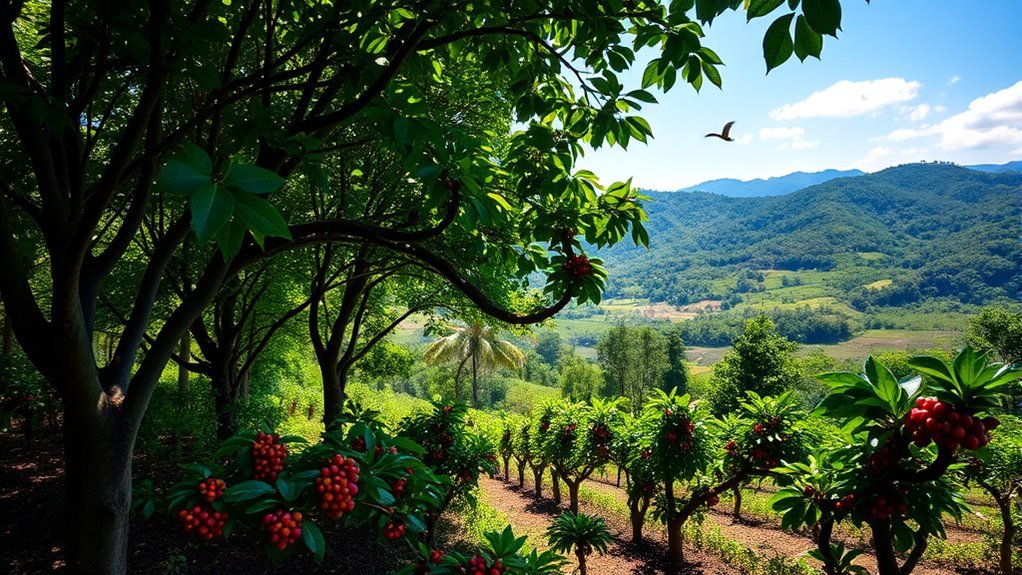
You’ll find that shade-grown coffee supports biodiversity by preserving natural habitats for various species. It also improves soil health by maintaining organic matter and reducing erosion. Plus, it cuts down on chemical use, making it a more sustainable choice for both farmers and the environment.
Biodiversity Preservation
When coffee is grown under the canopy of native trees, it creates a habitat that supports a wide range of plant and animal species. This shade-grown method preserves biodiversity hotspots, safeguarding essential ecosystem services we all depend on. By choosing shade-grown coffee, you help maintain:
- Diverse wildlife populations, including birds and insects crucial for pollination
- Natural pest control, reducing the need for chemical inputs
- Carbon sequestration through mature trees, combating climate change
- Water regulation, preserving watersheds and soil moisture
Supporting shade-grown coffee means you’re advocating for coffee production that respects nature’s balance. You’re not just enjoying your morning brew; you’re protecting ecosystems that sustain life and freedom. This approach is a powerful step toward environmental resilience and your role in conserving biodiversity in coffee-growing regions worldwide.
Soil Health Improvement
Because shade-grown coffee relies on native trees that protect the soil, it greatly improves soil health by preventing erosion and enhancing nutrient cycling. When you choose shade-grown coffee, you’re supporting a farming method that maintains rich soil biodiversity—microorganisms, fungi, and insects work together to break down organic matter, recycling nutrients back into the soil. This natural process keeps the land fertile without relying on external inputs. You’re not just drinking coffee; you’re fostering an ecosystem where soil remains robust and resilient, allowing farmers to cultivate crops sustainably and maintain their independence. By understanding how shade-grown coffee sustains nutrient cycling and soil biodiversity, you can make informed choices that promote freedom—from environmental degradation and unsustainable practices—while preserving the land for generations to come.
Reduced Chemical Use
Although conventional coffee farming often depends heavily on synthetic pesticides and fertilizers, shade-grown coffee greatly reduces the need for these chemicals. When you choose shade-grown coffee, you’re supporting methods that prioritize natural balance and reduce harmful inputs. This approach employs integrated pest management, which uses natural predators and ecological processes to control pests instead of chemicals. Plus, sustainable fertilizers derived from organic matter nourish the soil without polluting nearby ecosystems. Here’s how reduced chemical use benefits you and the environment:
- Minimizes toxic runoff into waterways, protecting wildlife and communities
- Encourages biodiversity by preserving natural habitats within coffee farms
- Lowers farmers’ exposure to hazardous substances, promoting health and safety
- Enhances coffee quality by fostering healthier plants and soil conditions
Organic Farming and Reduced Chemical Use
Since conventional coffee farming relies heavily on synthetic chemicals, switching to organic methods can greatly reduce environmental harm. When you choose coffee grown through organic farming, you support sustainable practices that protect soil health and biodiversity. Organic certification guarantees farmers avoid synthetic pesticides and fertilizers, which often contaminate water sources and degrade ecosystems. By embracing organic farming, you empower farmers to foster natural pest control and nutrient cycling without harmful inputs. This approach not only safeguards the environment but also promotes your freedom to consume coffee guilt-free, knowing it’s produced responsibly. Adopting organic practices challenges the status quo of chemical dependence in agriculture, paving the way for a healthier planet and a more sustainable coffee industry. It’s a conscious choice that benefits both nature and your well-being.
Role of Fair Trade and Consumer Choices
How much power do you really have as a consumer when it comes to promoting ethical coffee production? Quite a bit, actually. Your choices can drive demand for fair trade coffee, supporting farmers and reducing environmental harm. Consumer awareness is key—it pushes companies to adopt sustainable practices and transparency.
When you opt for fair trade coffee, you:
- Guarantee fair wages and safe working conditions for farmers
- Encourage environmentally friendly cultivation methods
- Support community development projects in coffee-growing regions
- Influence market trends toward sustainability and equity
Frequently Asked Questions
How Does Coffee Packaging Impact Environmental Sustainability?
When you choose coffee packaging, it directly affects environmental sustainability. Traditional packaging often relies on plastics that linger in landfills, but biodegradable materials offer a cleaner alternative. You can support packaging innovations that reduce waste and carbon footprints, helping protect the planet. By demanding eco-friendly options, you’re pushing the industry toward freedom from harmful practices, ensuring your coffee habit contributes to a healthier Earth rather than more pollution.
What Are the Carbon Emissions From Coffee Transportation?
When you consider coffee logistics, transportation emissions play a big role in your cup’s carbon footprint. Shipping green beans from farms to roasters often involves long distances and fuel-intensive methods like trucks, ships, and planes. These emissions contribute greatly to global greenhouse gases. You can advocate for more local sourcing or support brands using efficient transport routes and eco-friendly fuels, helping reduce the environmental cost tied to coffee’s journey to you.
Can Coffee Grounds Be Used for Home Composting?
Yes, you can definitely use coffee grounds for home composting. Coffee ground benefits include enriching your compost with nitrogen, which helps speed up decomposition. To maximize results, mix the grounds with brown materials like dry leaves or paper, following proper composting techniques. This balance prevents odors and attracts beneficial microbes. By composting coffee grounds, you reduce waste and create nutrient-rich soil, giving you more freedom to garden sustainably and responsibly.
How Does Caffeine Extraction Affect Waste Production?
You might think caffeine extraction produces mountains of waste, and in some ways, it does! When caffeine’s sourced, a significant amount of organic material is left behind, demanding effective waste management to avoid environmental harm. If you care about freedom from pollution, advocating for improved extraction methods and recycling byproducts is essential. This approach reduces waste and supports a cleaner, more sustainable caffeine industry, letting you enjoy your coffee guilt-free.
Are There Certifications for Environmentally Friendly Coffee Shops?
Yes, you can find certifications for environmentally friendly coffee shops that help you identify places committed to eco friendly practices. Certification criteria often include waste reduction, energy efficiency, water conservation, and sourcing sustainable coffee beans. By choosing certified shops, you support businesses held accountable to green standards, empowering you to make freedom-respecting choices that reduce environmental impact while enjoying your coffee. Look for labels like Green Restaurant Association or LEED certification.
